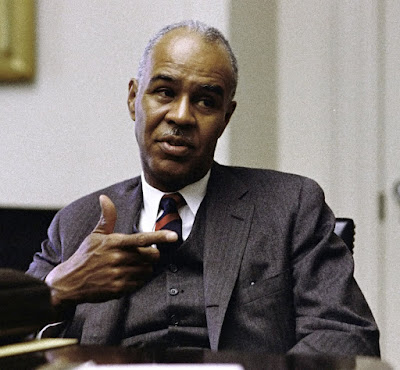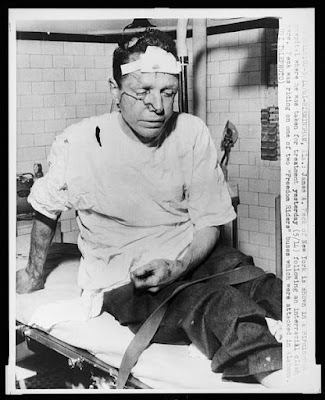Benjamin Oliver Davis Jr. was born in Washington. D.C. on December 18, 1912. His father was a military officer, the first African American General in the United States Army. Benjamin, Sr. served in various capacities (beginning in the Spanish-American war) including serving in one of the original Buffalo Soldier regiments. His mother died from complications from childbirth in 1916 when Benjamin, Jr. was four years old.
When Davis, was 13 years old, he attended a barnstorming exhibition at Bolling Field in Washington, D.C. (now Bolling Air Force base). One of the pilots offered him the opportunity to accompany him on a ride in his plane. Davis enjoyed it so much that he became determined to pilot a plane himself one day.
In 1929, Davis enrolled at Western Reserve University but after a year, he transferred to the University of Chicago. Still desiring to serve as a military pilot, he contacted Illinois Representative Oscar De Priest, who sponsored him for a spot in the United States Military Academy at West Point, New York in 1932. Throughout his four years at the Academy, none of his classmates would speak to him outside the line of duty. None would be his roommate and none would sit with him to eat. Nonetheless, he graduated in 1936, finishing 35th in his class of 278. When he received his commission as a second lieutenant in the infantry, he became one of only two Black combat officers in the United States Army, the other being his father. Davis earned the respect of his classmates, as evidenced by the note beneath his picture in the 1936 yearbook, the Howitzer:
"The courage, tenacity, and intelligence with which he conquered a problem incomparably more difficult than plebe year won for him the sincere admiration of his classmates, and his single-minded determination to continue in his chosen career cannot fail to inspire respect wherever fortune may lead him."
Because of his high standing in his graduating class, Davis should have had his choice of assignments, but when he opted to apply for the Army Air Corps he was denied because the Air Corps did not accept black soldiers. He was instead assigned to the 24th Infantry Regiment, an all-Black division located in Fort Benning, Georgia. Although an officer, he was not permitted to enter the officers club on the base. After attending the U.S. Army Infantry School, he followed in his father’s footsteps and traveled to Tuskegee, Alabama to teach a military tactics course at the Tuskegee Institute. On June 19, 1939, he was promoted to the rank of First Lieutenant and then to Captain.
Despite the prestige of being an instructor, Davis still wanted to fly. Fortunately, in 1941, the Roosevelt administration, in response to public pressure for greater black participation in the military as war approached (World War II), ordered the War Department to create a black flying unit. Captain Davis was assigned to the first training class at Tuskegee Army Air Field and in March 1942, earned his wings as one of five black officers to complete the course. He was the first black officer to solo an Army Air Corps aircraft. Davis was promoted to the rank of Lieutenant Colonel and in July 1942, he was assigned as the commander of the first all-black air unit, the 99th Pursuit Squadron, known by history as the Tuskegee Airmen.
The squadron, equipped with Curtiss P-40 fighters, was sent to Tunisia in North Africa in the spring of 1943. On June 2, they saw combat for the first time in a dive-bombing mission against the German-held island of Pantelleria as part of Operation Corkscrew. They also took part in the allied invasion of Sicily. In September 1943, Colonel Davis was recalled to Tuskegee to take over a larger all-black unit preparing for combat in Europe, the 332nd Fighter Group.
Almost immediately, however, problems arose for Colonel Davis. A number of Senior Army Air Corps officers complained to Army Chief of Staff George Marshall that the 99th Fighter Squadron had underperformed and should thereafter be taken out of combat. Major General Edwin House, Commander of the XII Air Support Command wrote in September 1943 that “the Negro type has not the proper reflexes to make a first-class fighter pilot.” Davis argued that no information had been presented to him that showed anything to suggest that the Black fighter pilots had performed unsatisfactorily. He presented his case to the War Department and held a press conference at the Pentagon. General Marshall called for an inquiry but allowed the 99th Squadron to continue to fight while the investigation continued. When the results of the inquiry came back, the 99th Squadron was vindicated and found to have performed similarly to other fighter squadrons. Any continuing arguments ceased in January 1944 when the squadron shot down 12 German fighters in a two days.
Soon thereafter Colonel Davis and the 332nd Fighter Group arrived in Italy where they were based at Ramitelli Airfield. The 332nd, called the Red Tails because of the distinctive paint scheme on the tails of their planes, performed well as bomber escorts, often being requested by bomber pilots because of their insistence on not abandoning the bombers. Colonel Davis was awarded the Silver Star for a mission in Austria and won the Distinguished Flying Cross for a bomber-escort mission to Munich, Germany in June, 1944. In 1945, Colonel Davis was placed in charge of all-black 477th Bombardment Group stationed at Godman Field in Kentucky.
By the end of the war, the airmen commanded by Colonel Davis had an outstanding record in combat. They flew more than 15,000 raids, shot down 111 enemy planes, and destroyed or damaged 273 on the ground at a cost of 66 of their own planes and losing only about 25 bombers.
After the end of World War II, new President Harry S. Truman signed Executive Order 9981 to fully integrate the military branches. Colonel Davis was called upon to help draft the new Air Force plan for carrying out this order. For the next few years he was assigned to the Pentagon and to posts overseas. When the Korean War broke out, he once again participated in the fighting, manning an F-86 fighter jet and leading the 51st Fighter-Interceptor Wing.
In the summer of 1949, Davis was assigned to attend the Air War College. He was the first African American permitted to attend the college and it was significant because further promotion was dependent upon successful graduation. Davis excelled and, upon graduation, received an assignment to serve at the United States Air Force Headquarters at the Pentagon.
Davis next served as Director of Operations and Training at Far East Air Forces Headquarters, Tokyo from 1954 until 1955, when he was assigned the position of Vice Commander, Thirteenth Air Force. He was promoted to the rank of Brigadier General, becoming the first African American General in the Air Force, in May 1960 and to Major General in January 1962. General Davis was promoted to the rank of Lieutenant General in April 1965 and retired from active duty on February 1, 1970 after more than 33 years of military service.
General Davis did not slow down upon his retirement, instead moving on to other ways to serve. In 1970 he was put in charge of the Federal Sky Marshall Program and in 1971, he was named Assistant Secretary of Transportation for Environment, Safety, and Consumer Affairs. In this role, he oversaw the creation and implementation of airport security and highway safety programs and procedures. After retiring from the Department of Transportation in 1975, he served on the American Battle Monuments Commission. Finally, on December 9, 1998, President Bill Clinton decorated General Davis with a four-star insignia, advancing him to the rank of General, U.S. Air Force.
General Benjamin O. Davis, Jr. passed away on July 4, 2002 and was buried with full military honors on July 17, 2002 at Arlington National Cemetery. His military decorations include:
- Air Force Distinguished Service Medal
- Army Distinguished Service Medal
- Air Medal with four oak leaf clusters
- Philippine Legion of Honor
- Legion of Merit with two oak leaf clusters
- Air Force Commendation Medal with two oak leaf clusters
- Distinguished Flying Cross
"General Davis is here today as living proof that a person can overcome adversity and discrimination, achieve great things, turn skeptics into believers; and through example and perseverance, one person can bring truly extraordinary change" – President Bill Clinton


















